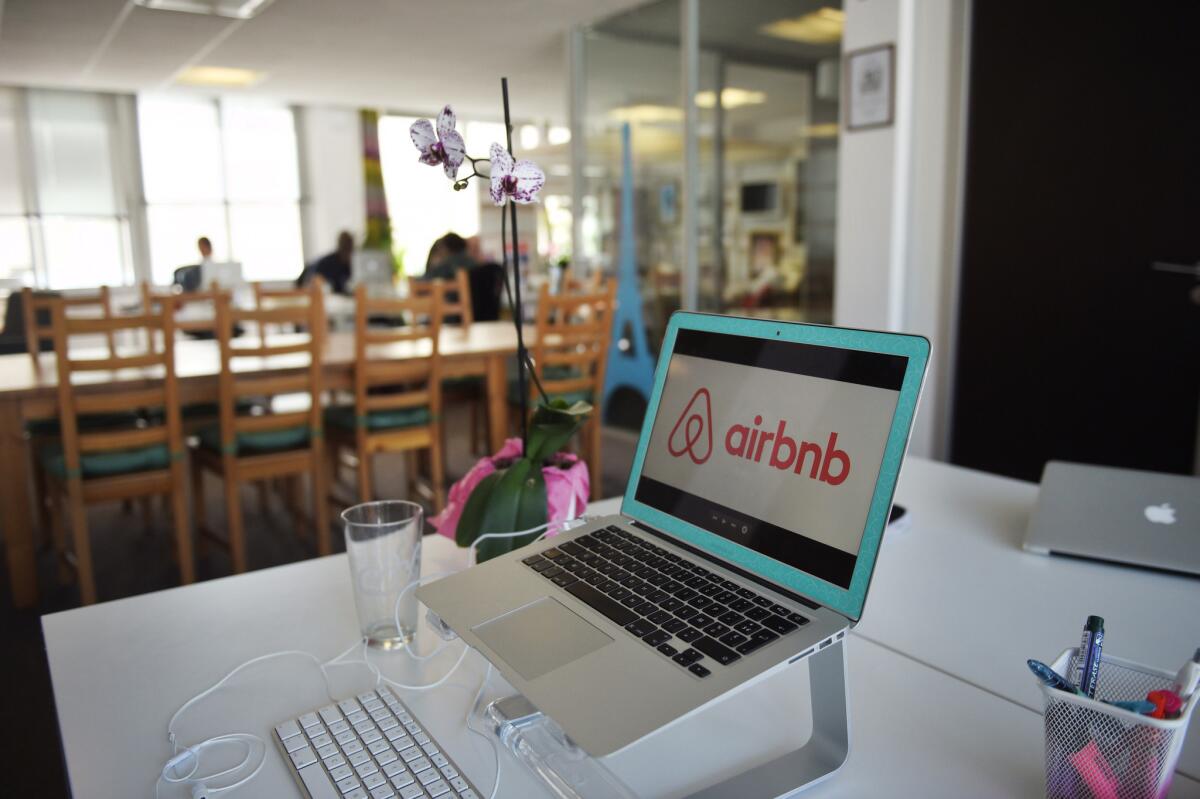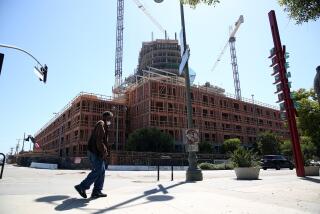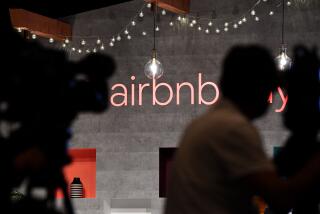Airbnb pledges $25 million to support affordable housing and small business

Home rental company Airbnb says it will invest $25 million toward affordable housing and other community needs, the latest plan by tech firms to ease a housing crisis their rapid growth has helped exacerbate.
Airbnb said the money would be split between Los Angeles County and the San Francisco Bay Area, the state’s largest urban centers, where residents are grappling with sky-high housing costs and a surge in homelessness. In addition to the preservation or creation of below-market rental housing, Airbnb said it would direct funding toward promoting homeownership for low- to moderate-income households, financing “meaningful infrastructure initiatives” through municipal bonds and supporting small businesses through loans.
“These investments have the potential to generate solid returns for our company and make communities stronger,” Airbnb Chief Executive Brian Chesky said in a statement.
Gov. Gavin Newsom, who has called on tech companies to support affordable housing, said in a statement Airbnb’s investment was “a critical first step on behalf of their community, and we need more businesses to follow their lead.”
Given the scale of the housing crisis, the money is unlikely to go far.
Affordable-housing developers use a variety of financing sources to get a project off the ground. But using one gauge of the cost to build affordable housing in California, $25 million would be enough to build 76 new homes.
Airbnb acknowledged the money wasn’t huge but said if the investments were successful, the company might expand the pilot program, directing more resources to “projects that support families and communities throughout California and across the country.”
California is among areas with the most pressing need.
Since 2012, the median home price has soared nearly 80% to $548,600 while the average rent for a vacant apartment is up 42% to $2,288, according to Zillow.
Many economists blame the swift rise on cities and residents who fight new development and block builders from constructing enough homes to meet demand from population and job growth. Several recent studies have also found rising rents in high-cost areas lead to increased homelessness, tipping already at-risk people into the streets.
Tech firms have drawn criticism for not doing enough to mitigate the effects on communities of their rapid expansion. Beyond the Bay Area, well-paid tech workers have put upward pressure on rents and home prices on Los Angeles’ Westside as Venice and Playa Vista have morphed into the tech hub known as Silicon Beach.
Earlier this year, Newsom said he was meeting with Silicon Valley executives about contributing $500 million to provide developers with low-interest loans to help build housing for middle-income residents. That money has failed to materialize, but Chesky said Airbnb’s investment was inspired by the governor’s leadership.
Other companies have also made their own announcements, separate from the middle-income plan.
Google, for example, said in June it would lease $750 million worth of its land to developers to build at least 15,000 homes and launch a $250-million investment fund to provide incentive for developers to build at least 5,000 affordable housing units.
Microsoft has also announced investments in the Seattle area, while the personal philanthropic company of Facebook Chief Executive Mark Zuckerberg has directed tens of millions to support affordable housing in the Bay Area.
Unlike other companies, which have contributed to the housing crisis indirectly through the growth of their well-paid workforces, Airbnb has been accused of exacerbating the home shortage as part of its business model.
The company, through its online platform, allows people to rent out rooms or entire apartments to travelers on a nightly basis.
In 2017, the Los Angeles City Planning Department estimated that 6,000 to 10,000 units that otherwise would probably be available to long-term tenants were being used chiefly for short-term rentals advertised through Airbnb and other platforms. The study said the rentals were less than 1% of the city’s overall housing stock but were highly concentrated in neighborhoods such as Venice, Hollywood and downtown.
In July, a new law took effect in Los Angeles that sharply restricted rentals of 30 days or fewer, as the city joined other municipalities including Santa Monica in cracking down on short-term rentals.
In an email, Airbnb spokeswoman Mattie Zazueta pointed to a study commissioned by the company that found the platform had not “considerably expanded” Los Angeles’ short-term rental market. And in a news release Tuesday, the company cited a survey in which 55% of U.S. Airbnb hosts said hosting had helped them afford their own homes.
Zazueta said the company didn’t have an estimate of how many affordable homes would be created because of Airbnb’s investments because it was “just beginning to identify the precise investments.” In a news release, the company said RBC Global Asset Management would invest the money on behalf of Airbnb.
“This is just a modest first step,” Chesky said, “but we are excited to launch this pilot program, learn more, and build on this work in the years ahead.”
Times staff writer Liam Dillon contributed to this report.







